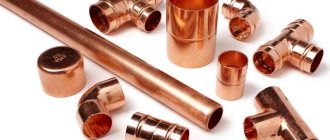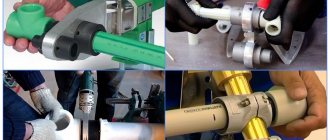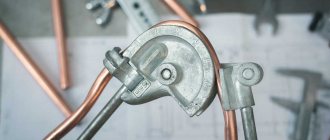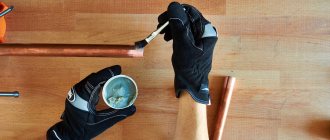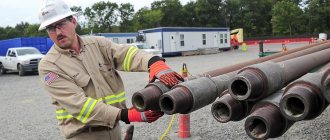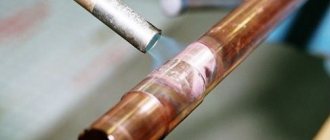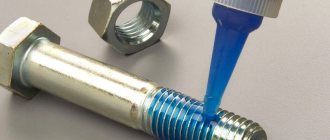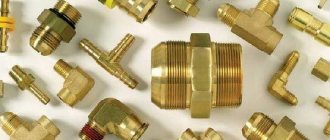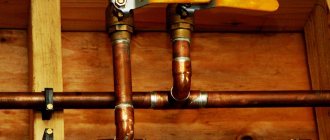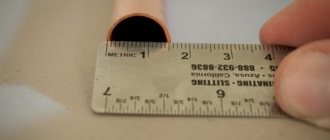✓ Pipes made of non-ferrous metals are widely used in many industries, as they have special characteristics - they are not subject to corrosion, they have maximum thermal conductivity, they are flexible and durable. But there is a rather big problem - they cannot be welded using standard welding tools, they only need to be soldered. The connection must be made only using special equipment for soldering pipes and using special technology using solders, including silver-containing solders.
How to solder pipes made of copper, brass and bronze
The process of soldering pipes made of non-ferrous metals is based on the fact that the seam between the pipe and the socket or two pipes is sealed using special solder. This solder is thermoplastic; it melts under high temperatures, after which it penetrates into the joints between the pipe and the fitting. It covers the entire joint layer. An important feature of using a thermoplastic composition is that after cooling it not only seals, but also fixes the junction of pipes and fittings. In this case, solder joints can be dismantled without any problems - they are simply heated by a pipe soldering device, after which the connection can be disconnected without effort. To summarize, by soldering non-ferrous metals, in particular pipes, it is possible to obtain a high-strength water supply system that combines the properties of detachable and non-separable connections.
Theory
Copper is one of the oldest metals, which is used by people to create various decorations, devices and communications. It is characterized by high plasticity and pinkish-red color, sometimes with a golden tint. In the household, copper is most often used in water pipes and heating, because it does not corrode and is resistant to temperature changes.
Photo - copper connections
There are many types of soldering; capillary soldering is used for copper. It allows you to connect two parts of a pipeline or radio components as accurately and firmly as possible. This thermal effect is also divided into:
- High temperature;
- Low temperature.
High-temperature soldering is characterized by higher weld strength. In addition, it allows the connection to be thermally stable, which is very important for various communications. But at the same time, this type of work is not used on threaded connections. To carry out such soldering, special equipment is required - a burner with piezo ignition and acetyl, propane.
Photo - copper elements
Low temperature is used when working with soft solders (pastes, gels). The main advantage of this technique is the simplicity and ease of work. It is carried out at a temperature lower than 425 degrees, so soldering can even be done with a soldering iron. It lies in the fact that, under the influence of a certain temperature, the solder applied to the gap between the part and the area being connected expands, closing the gap.
Photo - soldering process
There is also one important rule that must not be violated under any circumstances. Soldering copper and aluminum, or aluminum and brass, is strictly prohibited. It is performed for electrical wires, for example, if you need to branch the wiring in old houses. This is prohibited due to the difference in linear thermal expansion of the metals and the likelihood of a short circuit at the joint.
What is needed for soldering non-ferrous metals
In order to solder copper, brass and bronze pipes, you need to ensure that you have special tools and materials for soldering, the price of which may vary. Such tools include portable gas torches, oxy-fuel units (soldering stations) or electrical devices. As well as various consumables for soldering, in particular hard and soft solders, fluxes. All this can be found in the catalog “Tools and materials for soldering and welding” of our company.
Is it possible to create an instrument with your own hands?
If you set a goal, then you can make any instrument yourself. An electric soldering iron for copper pipes is no exception. But to solve this problem you will have to work hard. Each element of the soldering station design needs to be given enough attention.
The task of creating high-power electric soldering irons is complex. It's one thing to make a device for working with wires yourself. On the Internet you can find a lot of options for creating such a tool. But it is not rational to design a device with a power of two thousand watts on your own.
Any mistake made can result in serious trouble. This especially concerns the safety of using power tools. As a last resort, use special hair dryers or a gas torch to solder pipes. If you cannot use this toolkit, it is better to rent a normal factory electric soldering iron.
Watch the video:
Solder for soldering non-ferrous metals
Solder for copper pipes is divided into two types: hard (high temperature) solder or soft (low temperature) solder. The choice of one or the other is determined by the specific application of the pipeline.
Soft solders.
have a melting point lower than that of copper (usually about 250 g). When using soft solders, it is necessary to use flux or a special paste based on it. By using flux at the soldering site, the adhesive properties of the surface are improved.
Hard solders.
They are made on the basis of copper with phosphorus or silver. This type of solder is suitable for soldering not only copper-copper or brass-brass joints, but also copper-steel. Hard solder is more resistant to tearing and abrasion.
Tool Features
The electric soldering iron for copper pipes is primarily designed for low-temperature soldering. Most models create a temperature of four hundred and fifty degrees. For such soldering, soft solder is used: tin-lead or tin-copper.
There are various types of tools available for sale. There are models powered by a standard 220 V power supply. There are soldering irons that require the use of step-down devices to operate. The first option is easier than the second.
When choosing a tool, you need to pay attention to some of its characteristics:
- power;
- heating temperature;
- weight.
The heating rate and the maximum diameter of pipes that can be soldered depend on the power of the device. The higher it is, the faster copper soldering is carried out. The weight of the instrument indicates the degree of mobility of the device. If you need to constantly move between several objects, you should choose a device with light weight.
Heating temperature is also an important parameter. Modern models of electric soldering irons can be used for both low-temperature and high-temperature soldering. There are devices in which this indicator is equal to nine hundred degrees.
Please note that the type of device in question is not suitable for soldering small cross-section copper wires. For this purpose, it is more correct to use the most ordinary electric soldering iron with a power of up to one hundred watts.
Torches for soldering copper, brass, red bronze
Burners can be mobile or stationary. Mobile tools are perfect for non-professional use at home, and stationary ones (electric or oxygen gas) are ideal for those who specialize in the repair or installation of water supply systems based on non-ferrous metal pipes.
Mobile burners with replaceable disposable cylinders filled with a gas mixture are very easy to use - you just need to light it and point it at the place that needs to be soldered. Used with hard and soft solders. Their important feature is that they can be used for household needs.
Gas welding stations are special equipment and are used when installing water pipes or other similar structures. They are mobile and designed for long-term use. The gas used is standard propane-butane or acetylene.
You can select and buy all the necessary equipment, tools and materials for soldering and welding, and consumables for soldering pipes made of non-ferrous metals in our company. All tools for soldering copper pipes have a company guarantee. We, in turn, guarantee high quality of all products, affordable prices and the possibility of delivery both to the customer’s site and to any region of the Russian Federation.
Electric soldering iron Rothenberger
There are quite a lot of companies producing electrical equipment for soldering copper products. The products of the German company Rothenberger are especially popular. Devices from this manufacturer are considered reliable and practical.
The Rotherm 2000 electric soldering iron model is the most popular. The device is used for soldering copper pipes with a diameter of six to fifty-four millimeters. Ideal for use on construction sites.
The tool has the following characteristics:
- power - 2000 watts;
- mains voltage - 230 volts;
- frequency - 50/60 hertz;
- weight - 10.5 kilograms;
- cable length - 4 meters.
The high power of the device allows you to use a soldering iron even for high-temperature soldering. The device easily replaces a gas burner. It can be used near objects near which open flames should not be used.
The equipment has an automatic shutdown system. Overheating of the handles is prevented due to the cooling fins made of stainless steel on the arms of the pliers. The procedure for replacing electrode holders and electrodes is simple. Thanks to the flexible and fairly long cable, you can work with this device even in the most difficult to reach places. For a high-power electric soldering iron, this device is lightweight, which ensures good mobility of its use.
The equipment package includes:
- solder paste and solder;
- pipe cleaners for cleaning pipes from the inside;
- cleaning sponges.
The price of the Rotherm 2000 device is quite high. But it is better to buy this model than to use a Chinese-made tool, which is unstable and breaks quickly.
If we are talking about one-time soldering of copper products, the device can be rented. There are quite a few companies that will help you with this. This service really helps. There is no point in buying equipment for a one-time use if you can rent the device and quickly solve the necessary problem.
Soldering tools
Before starting work, you need to prepare special tools and devices for soldering copper connections. You will need:
- Gas or oxygen torch for soldering copper (with nitrogen, acetate, etc.);
- Solder (for capillary soldering according to GOST R 52955-2008);
- A brush (hard, but not metal) and abrasive paper for stripping copper connections;
- Fittings or other connected elements;
- Soldering flux.
It should be noted that if the work is done on pipe connections, then you may also need a chamfer, an expander, or a special cutting device. All of these fixtures can be found at a professional plumber so you don't have to buy them.
Photo - burner
Burners for copper are: professional (for working with hard solders), for heating pipes and soldering with soft pastes, semi-professional or combined. There are also special hair dryers that are used for soft soldering. They allow you to quickly heat the joint at temperatures up to 650 degrees.
Solders are:
- Solid. They are represented by rods of a certain diameter, which is selected based on a certain gap when connecting. It is used when connecting copper and iron in water supply systems, gas supply and air conditioning systems. This solder can be with phosphorus or silver;
Photo - hard solder - Soft ones can be either in the form of paste or thin wire up to 3 mm in diameter. They are produced with lead and tin. Also sometimes the process is carried out with orthophosphoric acid.
Also, to join copper alloys, it is necessary to use flux. It performs several useful functions: it promotes better spreading of solder over the metal, protects the processing area from an oxygen film, and cleans the seam from oxide. Fluxes come with borax (for various high-temperature solders), used for medium-melting compounds of gold, copper, bronze, cast iron, and stainless steel. Outwardly, they look like a paste and are applied with a special brush.
Photo - flux paste
Brushes and abrasive sheets (sandpaper) are needed to remove solder residues from the seam after finishing work. Fittings are selected based on the required connections (they can be branching, corner, curved, etc.).
Photo - soldering iron
Welding
Let's look at how copper pipe soldering is done with your own hands:
- Any technology involves pipe preparation. You will need to cut the communication to the desired size and trim the ends with a bevel gun. This is necessary so that the next element is not damaged during connection and the maximum rigid adhesion of the parts is obtained;
- Soldering flux is applied to the edge of the copper pipe, and it is also applied to the fitting or other pipe. Afterwards you need to carefully insert the communications into each other. If soldering is done with self-fluxing solder or an electrode, then flux does not need to be used;
- The selected solder is inserted into the joint. It should be noted that if a paste is used, it must be applied after the flux. Under the influence of a certain temperature, the substance will begin to melt, filling the free space in the pipe. A very important point: the solder cannot be exposed to direct fire, it should melt only from the heat of the heated pipe;
Photo - soldering with solder - If tinning is used, then the flux and solder are applied in a very thin layer, otherwise an unsightly volumetric seam will form at the soldering site. If locks or radio components (usb, contacts) are repaired, this may disrupt the operation of the element;
- After heating is completed, the tool is removed. At this moment, the pipe cannot be moved - the connection is still too plastic, and turning the metal bends can damage the fastening. Copper pipes cool naturally;
- All that remains is to remove the remaining solder or flux with a brush, abrasive paper or brush. It is not recommended to overcool the joint during the first 24 hours, when the metal solidification process is not completed.
Photo - after cleaning
You can buy all the necessary tools used to solder bronze or copper at any electrical store; the price depends on the category. Burners cost from 3 dollars to several dozen, the cost of solder starts from 5 cu. e., flux - from 3.
